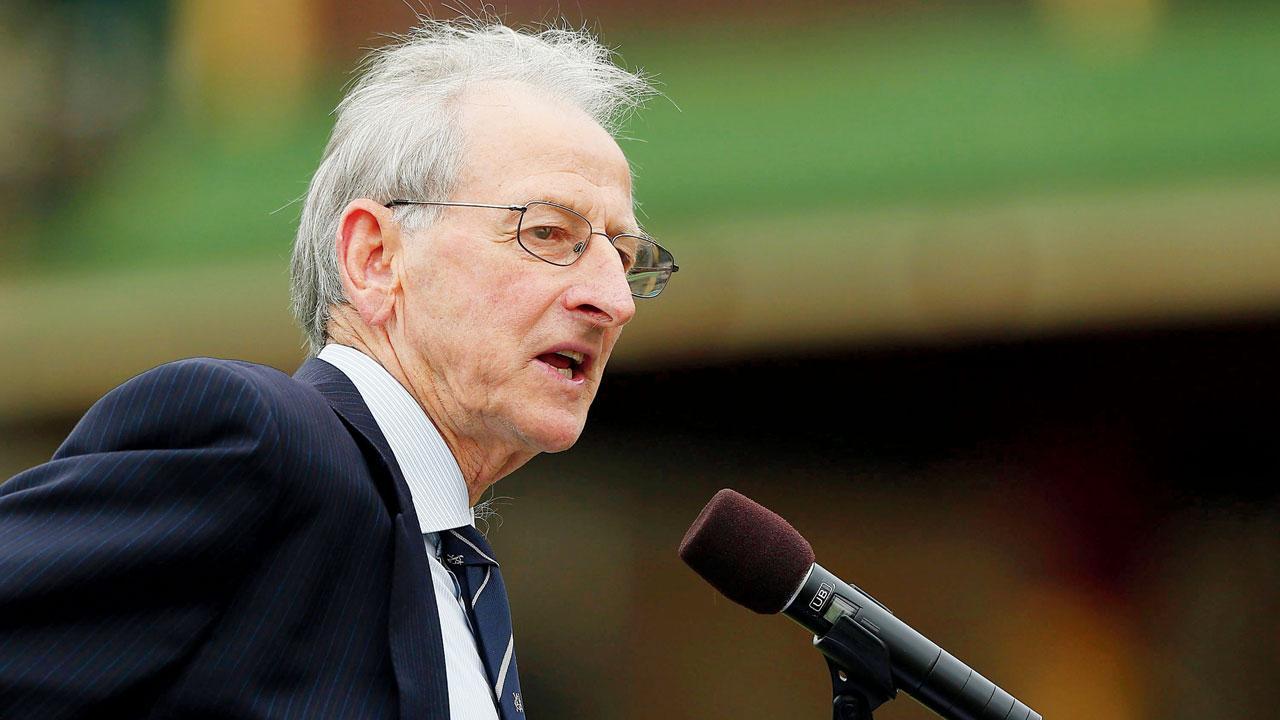Cricket Tasmania is of the view that the Australian cricket board is treating Tim Paine like they did Bill Lawry in a captaincy issue in 1971. Here’s what happened 50 seasons ago...

Bill Lawry during the Tony Greig memorial service at Sydney Cricket Ground on January 20, 2013. Pic/Getty Images
 It’s interesting how a forgotten figure is thought of in a current situation. It happened to former Australia captain Bill Lawry when Cricket Tasmania chairman Andrew Gaggin fired a rocket at Cricket Australia for the way they have handled the Tim Paine controversy.
It’s interesting how a forgotten figure is thought of in a current situation. It happened to former Australia captain Bill Lawry when Cricket Tasmania chairman Andrew Gaggin fired a rocket at Cricket Australia for the way they have handled the Tim Paine controversy.
ADVERTISEMENT
Gaggin took exception to CA chairman Richard Freudenstein and CEO Nick Hockley saying that they would have sacked Paine if they were at the helm of affairs in 2018 when Paine’s lewd text messages to an employee of Cricket Tasmania came to light.
It must be stressed that Paine was investigated and cleared by CA’s integrity unit then.
“Tim Paine has been a beacon for Australian cricket over the past four years and instrumental in salvaging the reputation of the national team after the calamity of Cape Town. Yet, at a time when CA should have supported Tim, he was evidently regarded as dispensable. The treatment afforded to the Australian Test captain by CA has been appalling, and the worst since Bill Lawry 50 years ago,” said Gaggin in a statement earlier this week.
So here’s what happened to Lawry half a century ago. Australia were hosting England in the 1970-71 Ashes. England went one-up in the fourth Test at Sydney. The Melbourne and Adelaide Tests were drawn and the selectors—Sir Donald Bradman, Neil Harvey and Sam Loxton—weren’t impressed. Lawry may have been sound on strategy, but flair, daring and adventure were not his strong points. An example of that came in the 1968-69 season when he didn’t enforce the follow-on against the West Indies in the fifth Test at Sydney and set them a ridiculously impossible victory target of 735 runs. Bradman & Co decided that a change was required and named Ian Chappell as Australia’s 36th Test captain.
Also Read: Three deaths and a triumph
Neither the selectors nor the cricket board informed Lawry of his sacking even as some of his teammates knew about it in Adelaide itself.
England were leading the series and Lawry’s men were annihilated by South Africa 0-4 in 1969-70, the very same season they beat MAK Pataudi’s team 3-1 on Indian soil.
“The selectors probably were looking for a change—that’s fair enough—but it was the manner in which the axe fell. In the situation as captain you have discussions with selectors and at least they, or one of them, should have said, ‘Well, you are going to miss out tomorrow.’ That would have been acceptable. The mode of finding out was the biggest disappointment—over the radio,” Lawry told cricket writer Keith Butler in a book titled Howzat.
Lawry became the first Australian regular captain to be replaced right in the middle of a series and mind you, the Ashes weren’t surrendered until then. He was very much a players’ captain, so when his touring team were subjected to some pathetic living conditions and tiresome train journeys on the Indian tour—which was followed by an ill-timed South Africa tour—Lawry wrote a letter to the Board raising his objections and demanding better facilities on future tours. The players were aware of Lawry’s intention of writing to the Board and his deputy Chappell advised him not to be the sole signatory of that letter because his detractors would then look for the slightest excuse to sack him. Lawry went ahead and signed it alone. This could well have been a big reason behind him getting the boot.
“The axe came down before the final Test. A week short of thirty-four, the man who had held many a bridge for his country felt like not Horatius but Humpty Dumpty. Teams he led won nine Tests, lost eight and eight were unfinished. No trace of sourness has been heard in his radio or television comments,” wrote Ray Robinson in his widely-acclaimed book On Top Down Under.
Lawry’s successor got the news of his elevation as captain through a telephone call from South Australia cricketer-turned-journalist Alan Shiell while having a counter lunch in Adelaide. “The bastards won’t get me like they got Bill,” was Chappell’s response when his then-wife Kay congratulated him on being named captain of Australia.
Australia lost the 1970-71 Ashes 0-2 when Ray Illingworth’s side won the seventh Test at Sydney, where Chappell took over. But a new era dawned. When Chappell decided enough was enough with captaincy after the 1975 Ashes triumph in England, he hadn’t lost a Test series as captain.
The Paine saga too could well open a new, rewarding chapter for Australian cricket. But like in the case of Lawry, he’ll go down in history as a captain who was probably hard done by, courtesy a far-from-perfect establishment.
mid-day’s group sports editor Clayton Murzello is a purist with an open stance.
He tweets @ClaytonMurzello. Send your feedback to mailbag@mid-day.com
The views expressed in this column are the individual’s and don’t represent those of the paper.
Also Read: Why not Pat Cummins as Australia's captain?
 Subscribe today by clicking the link and stay updated with the latest news!" Click here!
Subscribe today by clicking the link and stay updated with the latest news!" Click here!







